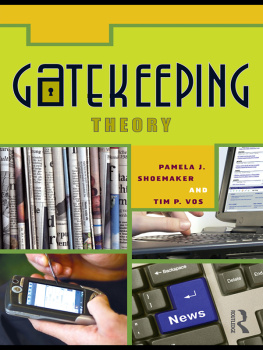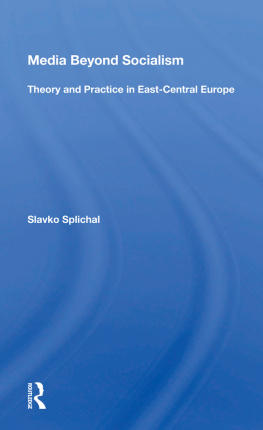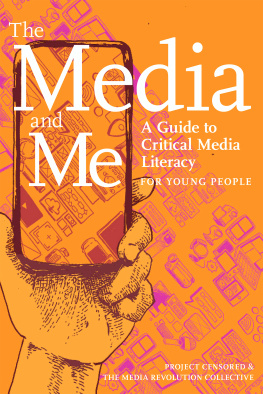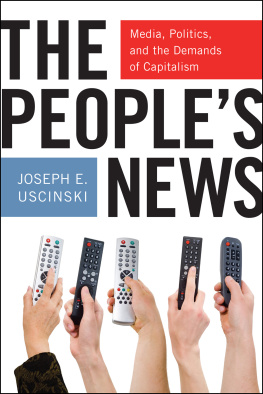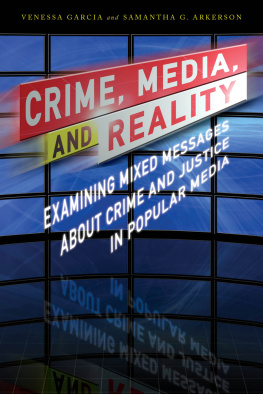Gatekeeping Theory
Gatekeeping is one of the medias central roles in public life: People rely on mediators to transform information about billions of events into a manageable number of media messages. This process determines not only which information is selected, but also what the content and nature of messages, such as news, will be. Gatekeeping Theory describes the powerful process through which events are covered by the mass media, explaining how and why certain information either passes through gates or is closed off from media attention. This book is essential for understanding how even single, seemingly trivial gatekeeping decisions can come together to shape an audiences view of the world, and illustrates what is at stake in the process.
Pamela J. Shoemaker is John Ben Snow Professor at the S.I. Newhouse School of Public Communications at Syracuse University. She is author of News Around the World (with Akiba Cohen), How to Build Social Science Theories (with James Tankard and Dominic Lasorsa), and Mediating the Message (with Stephen Reese).
Tim P. Vos is Assistant Professor of Journalism Studies at the University of Missouri.
Gatekeeping Theory
Pamela J. Shoemaker
Tim P. Vos
First published 2009
by Routledge
270 Madison Ave, New York, NY 10016
Simultaneously published in the UK
by Routledge
2 Park Square, Milton Park, Abingdon, Oxon OX14 4RN
Routledge is an imprint of the Taylor & Francis Group, an informa business
This edition published in the Taylor & Francis e-Library, 2009.
To purchase your own copy of this or any of Taylor & Francis or Routledges collection of thousands of eBooks please go to www.eBookstore.tandf.co.uk.
2009 Taylor & Francis
All rights reserved. No part of this book may be reprinted or reproduced or utilised in any form or by any electronic, mechanical, or other means, now known or hereafter invented, including photocopying and recording, or in any information storage or retrieval system, without permission in writing from the publishers.
Trademark Notice: Product or corporate names may be trademarks or registered trademarks, and are used only for identification and explanation without intent to infringe.
Library of Congress Cataloging in Publication Data
A catalog record has been requested for this book
ISBN 0-203-93165-3 Master e-book ISBN
ISBN10: 0-415-98138-7 (hbk)
ISBN 10: 0-415-98139-5 (pbk)
ISBN10: 0-203-93165-3 (ebk)
ISBN13: 978-0-415-98138-5 (hbk)
ISBN 13: 978-0-415-98139-2 (pbk)
ISBN13: 978-0-203-93165-3 (ebk)
Acknowledgments
Many individuals contributed to this project, but four deserve special mention. This project ranged over several years and generations of graduate assistants. While a Masters student at Syracuse University, Rebecca Reynolds, now director of research at World Wide Workshop Foundation, originally helped to update the literature, past the 1991 edition of Gatekeeping in Sages Communication Concepts series. The task was taken on by Kevin Gang Han, now an assistant professor of journalism at Iowa State University. Bringing the book to publication were Syracuses John Ben Snow, research assistants Hyunjin Seo and Philip Johnson. They once again updated the books literature and responded to thousands of requests from us.
Thanks also to colleagues Amy Nyberg at Seton Hall University, Bryan Greenberg at Elizabethtown College, and Patrick Plaisance at Colorado State University, who have shared their thoughts and encouragement. A special thanks to Suzette Vos for her support and encouragement throughout this project.
Introduction
The Significance of Gatekeeping
Gatekeeping is the process of culling and crafting countless bits of information into the limited number of messages that reach people each day, and it is the center of the medias role in modern public life. People rely on mediators to transform information about billions of events into a manageable subset of media messages. On the face of it, narrowing so many potential messages to so few seems to be impossible, but there is a lengthy and long-established process that makes it happen day in and day out. This process determines not only which information is selected, but also what the content and nature of messages, such as news, will be. Explaining such a powerful process is the purpose of this book, and a look at recent history demonstrates what is at stake.
When the United States invaded Iraq in 2003, few journalists from the mainstream American news media questioned their countrys actions. Those who did were reprimanded as unpatriotic by the government, as well as by audience members, and some lost their jobs. With few exceptions, the news organizations fell into line and conveyed the news from reporters embedded with troops in the field (Boehlert, 2006).
When the Bush administrations case for the preemptive attack began falling apart in 2003 and 2004, some journalists retraced their steps to see what, if anything, they had done wrong. The Columbia Journalism Review asked whether reporters and editorial page writers should have been more aggressive watchdogs when examining the administrations case for war (Mooney, 2004). But such questions apparently had limits. When the so-called Downing Street memo was discovered, suggesting that American officials intended to fix the evidence to support the war, the mainstream U.S. news media initially gave the story little coverage (Bicket & Wall, 2007). How did information about the memo travel to and through channels of communication? What gates did it pass through and what gates closed? How did the mainstream American media come to the decision to give little attention to the memo? Gatekeeping scholarship helps us arrive at answers to such questions.
The theoretical underpinnings of American media law and policy assume that more media outlets are better than few. More news media create more messages that cover multiple aspects of an event and that vary in the information they contain. Thus a larger and more diversified menu of information makes it to the public, and the truth about an event is more likely to be revealed. Truth is supposed to be hard to hide when a marketplace of ideas is fostered through competition among many media outlets (Carter, Franklin, & Wright, 2005).
As it turns out, such a theory was supported by the story of the Downing Street memo, because reporting by the alternative U.S. news media ultimately forced the mainstream press to look at the memo and the war more closely. The fact remains, however, that initially the mainstream news outlets underplayed information that questioned the governments legitimacy. They sent essentially the same messages to the public. This does not support the assumption that having more media organizations results in a more diverse and rich information environment. Rather it suggests that most media organizations transmit news that is essentially alike, and the Downing Street memo is not a unique example. What can explain how so many media organizations can produce such similar output?
On the other hand, sometimes there are important differences in how news organizations cover an eventdifferent information is selected and different messages are produced. The history of the American media is replete with such examples, including coverage of the civil rights and womens rights movements in the middle of the last century, and in the 1970s the

